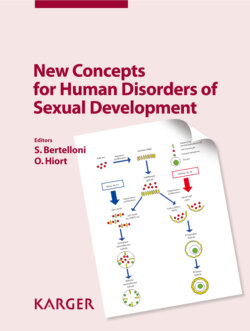Читать книгу New Concepts for Human Disorders of Sexual Development - Группа авторов - Страница 5
На сайте Литреса книга снята с продажи.
ОглавлениеSexual
Development
Sex Dev 2010;4:191
DOI: 10.1159/000315960
Preface
The disorders of sex development (DSD) represent an important field in both research and the clinical setting. In the last years, impressive improvements in both clinical management as well as structured research approaches have been made and they had major effects on clinical practice. Thus, the correct management of individuals with DSD requires updated scientific knowledge in this very specialized area, integrating basic and clinical information. In addition, doctors involved in the care of individuals with DSD need to develop specific personal skills in communication, ethics, legal issues, and, last but not least, the capacity to work together in a dedicated team, comprising biologists, genetists, neonatologists, pediatric endocrinologists, pediatric surgeons, psychologists, etc. The development of national as well as international networks is also mandatory to create stringent structures for correctly addressing the care of more difficult cases, creating data bases for improvement of epidemiology, and to offer better long-term outcome for our patients in the future.
In the last years, several initiatives renewed the interest of clinicians for DSD, for example: the ESPE/LWEPS Consensus Conference on Intersex Disorders (Chicago, USA, 2005), the constitution of a DSD Working Group within the European Society for Paediatric Endocrinology (ESPE), the EuroDSD network funded by the European Commission in the 7th Framework Programme. In addition, some dedicated specialized meetings were held in Germany and in Italy. These experiences permitted to exchange ideas and to create a well-integrated group of specialists working on DSD in Europe.
This themed issue of Sexual Development presents a series of articles mainly reflecting these experiences and written by colleagues who have been recognized as true experts in each chosen area. They cover several hot topics, provide short ‘state of the art’ papers on specific disorders and update some research or management aspects. We are also honored to host a special contribution from a patient support group to additionally open the eyes of scientists on the opinions and requests of affected people. All the authors have been selected based on their expertise, their documented distinctive competencies and their abilities to make complex topics available to all health care providers.
We hope that the readers will find this themed issue not only enjoyable but also helpful in the clinical care of individuals with DSD. In addition, we would like to take the opportunity to express our gratitude and thanks to all the authors involved in this selected issue for the high-level papers they submitted. We also thank the reviewers for their time and expertise as well as the Chief Editors of Sexual Development for giving us the honor to publish this elaborate issue. In particular, we need to thank Michael Schmid for his invaluable advice, support and friendship.
Silvano Bertelloni (Pisa)
Olaf Hiort (Lübeck)
May 2010
